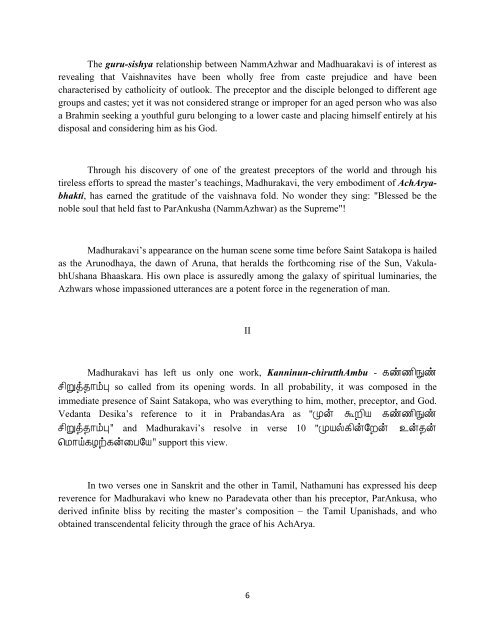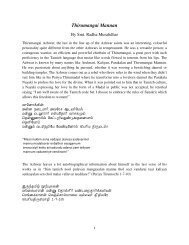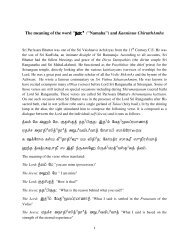The Hindu Temple Society of Canada - azhwar.org
The Hindu Temple Society of Canada - azhwar.org
The Hindu Temple Society of Canada - azhwar.org
You also want an ePaper? Increase the reach of your titles
YUMPU automatically turns print PDFs into web optimized ePapers that Google loves.
<strong>The</strong> guru-sishya relationship between NammAzhwar and Madhuarakavi is <strong>of</strong> interest asrevealing that Vaishnavites have been wholly free from caste prejudice and have beencharacterised by catholicity <strong>of</strong> outlook. <strong>The</strong> preceptor and the disciple belonged to different agegroups and castes; yet it was not considered strange or improper for an aged person who was alsoa Brahmin seeking a youthful guru belonging to a lower caste and placing himself entirely at hisdisposal and considering him as his God.Through his discovery <strong>of</strong> one <strong>of</strong> the greatest preceptors <strong>of</strong> the world and through histireless efforts to spread the master’s teachings, Madhurakavi, the very embodiment <strong>of</strong> AchAryabhakti,has earned the gratitude <strong>of</strong> the vaishnava fold. No wonder they sing: "Blessed be thenoble soul that held fast to ParAnkusha (NammAzhwar) as the Supreme"!Madhurakavi’s appearance on the human scene some time before Saint Satakopa is hailedas the Arunodhaya, the dawn <strong>of</strong> Aruna, that heralds the forthcoming rise <strong>of</strong> the Sun, VakulabhUshanaBhaaskara. His own place is assuredly among the galaxy <strong>of</strong> spiritual luminaries, theAzhwars whose impassioned utterances are a potent force in the regeneration <strong>of</strong> man.IIMadhurakavi has left us only one work, Kanninun-chirutthAmbu - ¸ñ½¢Ññº¢Úò¾¡õÒ so called from its opening words. In all probability, it was composed in theimmediate presence <strong>of</strong> Saint Satakopa, who was everything to him, mother, preceptor, and God.Vedanta Desika’s reference to it in PrabandasAra as "Óý ÜȢ ¸ñ½¢Ññº¢Úò¾¡õÒ" and Madhurakavi’s resolve in verse 10 "ÓÂø¸¢ý§Èý ¯ý¾ý¦Á¡ö¸Æü¸ý¨À§Â" support this view.In two verses one in Sanskrit and the other in Tamil, Nathamuni has expressed his deepreverence for Madhurakavi who knew no Paradevata other than his preceptor, ParAnkusa, whoderived infinite bliss by reciting the master’s composition – the Tamil Upanishads, and whoobtained transcendental felicity through the grace <strong>of</strong> his AchArya.6




